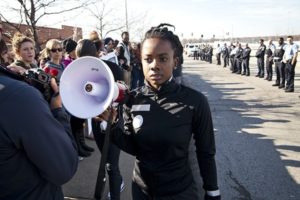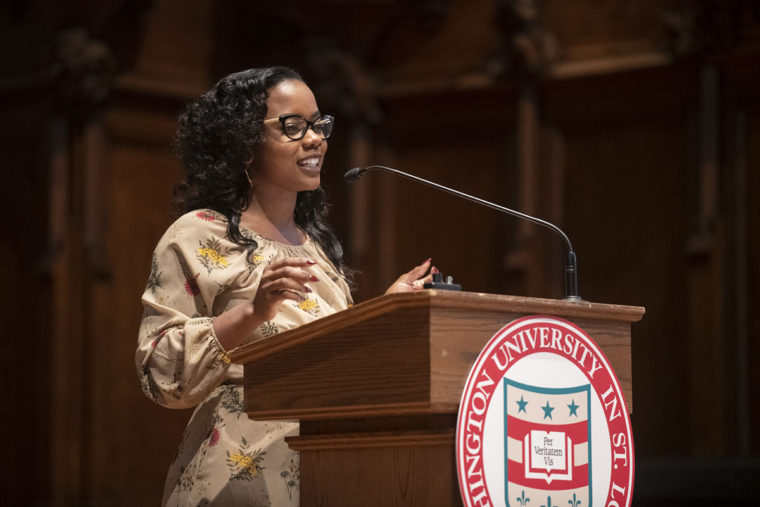Long before Tarana Burke earned nationwide recognition as the leader of the #MeToo movement, she served the young people in her community, advocating for their rights and caring for their well-being. In other words, she was a lot like Brittany Ferrell, social justice activist, nurse and Olin Fellow at Washington University in St. Louis.
Ferrell introduced Burke at her packed Oct. 25 lecture for the Assembly Series and the Olin Fellowship Program. The experience inspired Ferrell and steeled her for the long fight ahead. After all, Burke launched what has become the #MeToo movement more than a decade ago.
“It can be daunting,” said Ferrell, a first-year student at the Brown School. “You ask yourself: How much longer do we have to fight like this? The work of Tarana Burke and so many others reminds me to stay in it. It reminds me that I can continue to imagine a better world for us. And by us, I mean all black people and people of color, especially those of us impacted by multiple oppressions. We’re in it for the long haul.”

Ferrell began her fight for a different world on Aug. 9, 2014, the day Michael Brown was killed by a Ferguson police officer. She quickly emerged as a leader of the protest movement and co-founded Millennial Activists United, a collective of black queer women who organized actions across the St. Louis region. The acclaimed documentary “Whose Streets” captured Ferrell’s courage as an activist and her caring as a mom.
She credits social media for amplifying the overall movement but is wary of hashtag politics. Burke’s movement only gained traction after actress Alyssa Milano tweeted the hashtag. And, to this day, many activists are unaware that three black women started the Black Lives Matter network and organization.
“We, the movement, are fighting for our narrative,” Ferrell said. “So many people want to make it something it’s not. Or they want to portray us as something we are not. We are freedom fighters, liberationists and healers. Period.
“The world often won’t pay attention until a more palatable person or group of people champions the movement. But then you do your research and discover this movement has been here all along, and you get the truth and fight the urge to erase the work of many who are still organizing when the stories are no longer headlining the tabloids.”
Ferrell earned her nursing degree while she was organizing and loved working with patients. She had planned to earn her doctorate of nursing practice in nurse midwifery and work as a family nurse practitioner when a friend convinced her to apply to the Brown School. Now she wants to study maternal and reproductive health and health disparities through the lens of race and class.
Meanwhile, she also is a fellow for the Black Futures Lab, an organization founded by Black Lives Matter Network co-founder Alicia Garza and devoted to transforming black communities and building black political power on the local, state and federal level.
Ultimately, Ferrell hopes her experiences in the classroom and on the streets will help her strengthen the lives — physically and politically — of black people.
“I don’t know exactly what my future work will look like, but I want to do it here,” Ferrell said. “St. Louis is home for me, and while you can pick a place anywhere in this country and identify something that we need to organize around, I want to take care of home first.”
